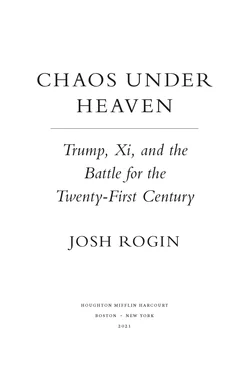Seeking to build pressure on Wall Street, he reached out to the office of the lawmaker he thought most amenable to his plan, Marco Rubio, and began working with Rubio’s senior foreign policy adviser Robert Zarate. He also sought out those industry groups that were meant to protect US investors. He began working with Christopher Iacovella, who headed up the American Securities Association, an industry organization meant to defend investors’ interests. Iacovella, like Robinson, was keenly aware of the danger posed by China’s unfettered access to US capital markets, and wanted to shake the rest of his countrymen awake. “The real issue was the Chinese companies that weren’t listed in our markets but money was flowing to them anyway, through the indexes,” Iacovella told me later. “We decided we really needed to start to get the word out because this was a huge problem.”
In June 2019, the battle between Washington and Wall Street over Chinese companies listed by US index providers became public when Rubio sent a letter to MSCI asking them to explain how these Chinese companies in their listings were structured internally and how connected they were to the Chinese government. Of course, there was no way for MSCI to answer, because nobody knew the answers to those questions. That was the point Rubio was trying to make. “In reality, what MSCI is doing is allowing the Chinese Communist Party controlled market, and its state-owned national champion companies, to access a critical source of capital and clothe itself in a façade of legitimacy,” the letter stated. This US financial firm, like so many others, was investing Americans’ savings, adding up to hundreds of billions of dollars, without an ounce of awareness or concern for where the money was going and how that might affect the country.
The index providers, backed by Mnuchin, simply ignored Rubio and others who raised concerns. So Robinson decided to try a new approach. If pointing out what the index providers were doing in a general sense wasn’t moving the needle, he thought, perhaps more lawmakers and officials would get involved if they realized that one of the funds that was set to increase its holding of problematic Chinese companies was the pension fund that managed the retirement savings of five million federal employees, including US military service members.
This was Robinson’s next target. Called the Thrift Savings Plan, it was governed by the Federal Retirement Thrift Investment Board, which was planning to switch the plan’s investment options. In the new proposed scheme, the only international option available to five million US federal employees to invest would be one that tracked a specific MSCI index that contained a number of problematic Chinese companies.
At first, Robinson’s new approach seemed to be working. More lawmakers joined the fight. More letters were written. More articles were published. But the Federal Retirement Thrift Investment Board refused to budge.
Rubio tried to advance legislation to force the board to change its mind, but Mike Crapo, chairman of the Senate Banking Committee, thwarted that plan at Mnuchin’s request. Mnuchin went to the president and told him if he intervened to stop the board, he would be disrupting the markets at the worst time and undermining the credibility of the biggest market index in the world. For the time being, Trump—who always had a hard time distinguishing the markets’ performance from his approval ratings—declined to intervene.
California Dreaming
Undeterred, Robinson turned his attention to another retirement fund: the California Public Employees’ Retirement System (CalPERS). Robinson had so far failed in his attempt to get the administrators of the Thrift Savings Plan to share his outrage about the index providers who were quietly channeling money to bad-actor Chinese firms. But if anything, CalPERS was an even bigger contributor to the problem. The California state pension system had the distinction of being the largest in the country—and its new chief investment officer, Ben Meng, also had a clear and troubling connection to the CCP.
Meng had taken the job of CalPERS CIO after returning from Beijing, where he had spent three years helping to manage the investments of China’s gargantuan State Administration of Foreign Exchange (SAFE), which has assets under management of more than $3 trillion US dollars. China’s foreign exchange reserves are a crucial part of the CCP’s financial security. In recent years, Beijing has clamped down on capital outflow, showing just how seriously they take the issue of obtaining and holding foreign money, especially US dollars.
At CalPERS, Meng guided investment decisions that increased the pension system’s already substantial exposure to Chinese companies, including major state-owned enterprises. During his first year, CalPERS tripled the number of Chinese companies it was investing in, including twenty-one connected to the PLA or sanctioned human rights abusers, according to research compiled by Robinson’s firm. CalPERS said it was just passively tracking the MSCI and FTSE Russell indexes, but its own disclosures showed that it was actually following a homegrown investment strategy that used the indexes as a guide but didn’t track them 100 percent.
Robinson’s efforts to draw attention to the CalPERS problem appeared to bear fruit when Representative Jim Banks (R-IN) wrote a letter to California governor Gavin Newsom in February 2020, alleging that Meng was recruited to work in China through the Thousand Talents program. The allegation was true, but Banks was accused of racism for targeting Meng, who is a Chinese-born naturalized US citizen. Trump’s Wall Street cabal reacted angrily as well—mounting a public campaign to stave off any efforts to force CalPERS to change course. But these friends of Meng didn’t disclose their own conflicts of interests or how driving US investor dollars into Chinese companies benefited their bottom lines as well.
One prominent Trump adviser who spoke out in Meng’s defense was Stephen Schwarzman. Not only did his private equity group, Blackstone, invest money on behalf of CalPERS, but Meng also was part of the Schwarzman Scholars program at Tsinghua University. “This type of attack on an accomplished American citizen is unwarranted,” Schwarzman told Bloomberg News . “Ben is a talented investor who has done a tremendous job for the pensioners.”
Robinson also used his deep connections and reputation to put his research in front of as many senior government officials as possible. He reached out to the NSC staff and shared his firm’s research on CalPERS. On March 13, national security adviser Robert O’Brien joined the battle, telling a crowd at the Heritage Foundation that the CalPERS investments in firms helping China’s military were extremely concerning. “I don’t see why we should be underwriting the Chinese defense industry,” he said.
Backed by the Treasury Department and the big banks, not one American index or pension fund has voluntarily divested one Chinese stock or bond in the face of congressional and administration pressure as of the time of this writing. But on May 20, 2020, Trump directed O’Brien and Larry Kudlow to issue a letter expressing the president’s opposition to the Thrift Savings Plan board’s proposal to increase its holding of Chinese stocks and bonds. The board relented. It was the first time China’s effort to secure American investor capital was rebuffed on national security grounds.
Meng resigned from his position as CIO at CalPERS in August 2020, just days after he was publicly accused of failing to properly disclose his own personal investments in Chinese companies at the same time he was steering California pension funds into China. CalPERS claimed Meng did nothing wrong and that his sudden resignation had nothing to do with his personal scandal or the controversy over the fund’s Chinese investments.
Читать дальше











